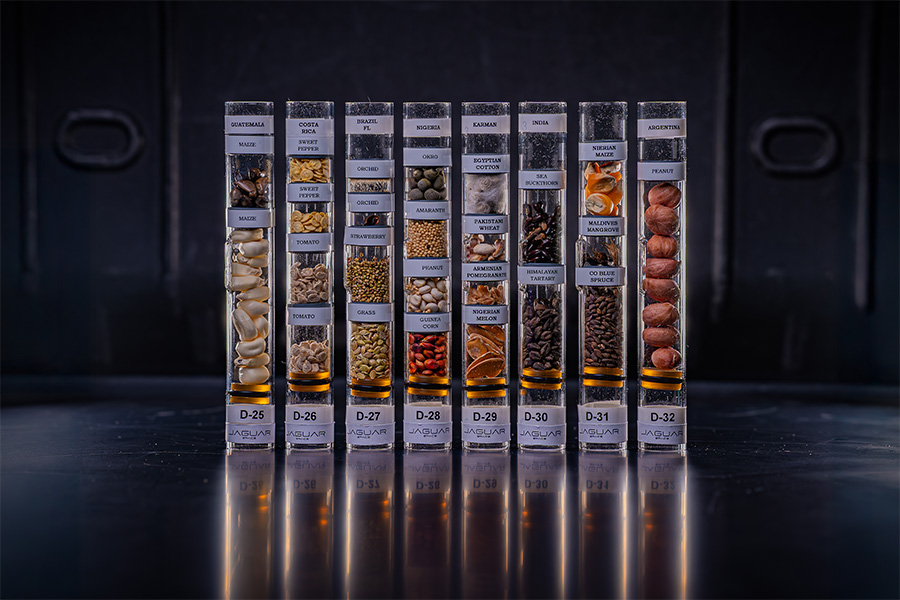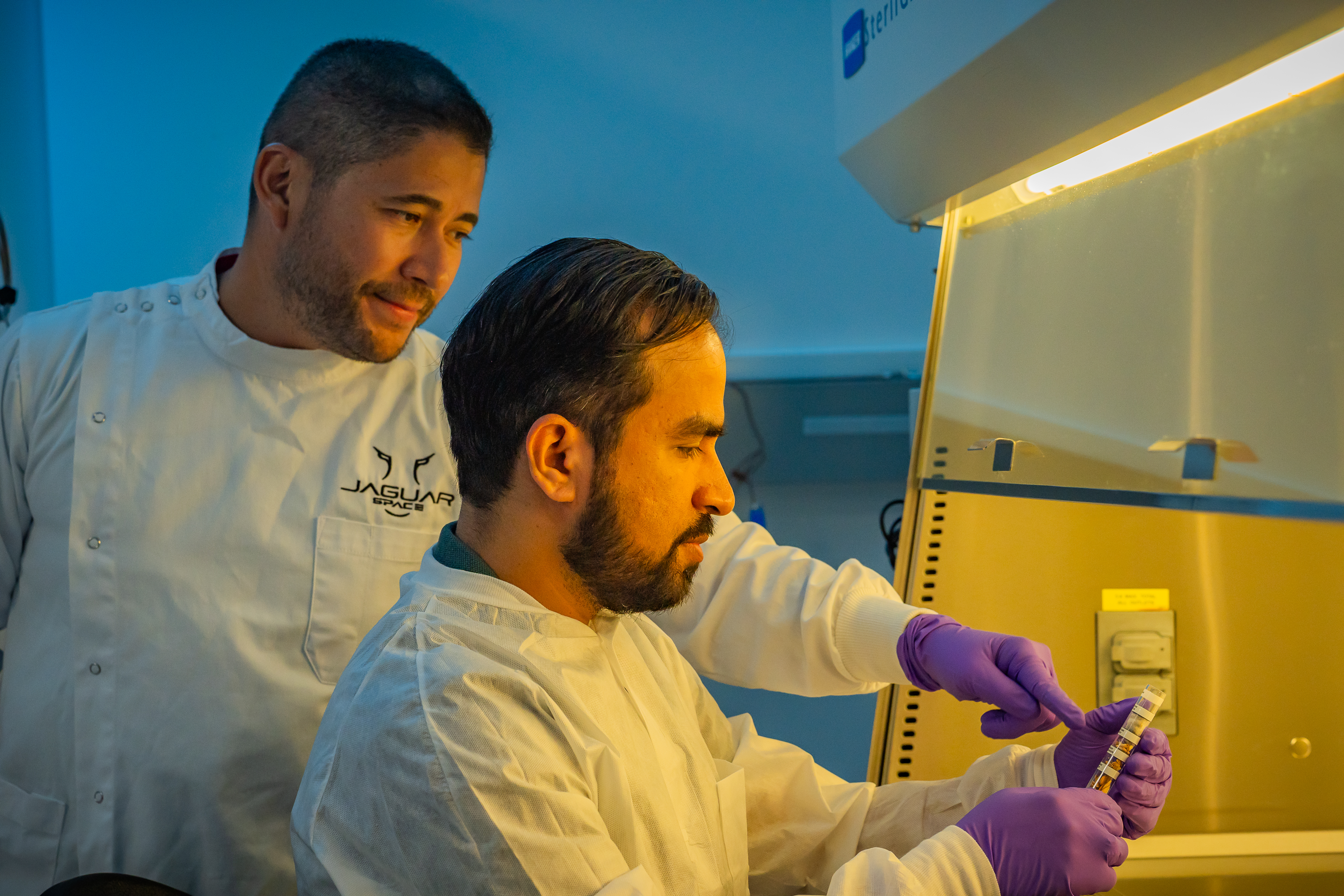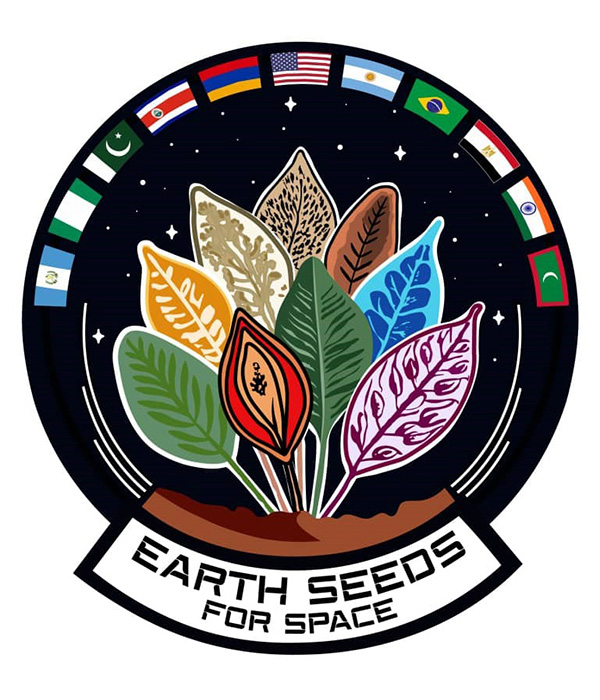Purdue PhD students send Pakistan's first experimental payload to ISS
Purdue PhD students send Pakistan's first experimental payload to ISS
| Author: | Alan Cesar |
|---|

Seeds from 11 nations, including the first-ever space payload from Pakistan, have launched to the International Space Station thanks in part to the efforts of two Purdue PhD students. Photo courtesy Jaguar Space/Ivan Castro Guatemala
Through an international collaboration, Purdue University PhD students Mahhad Nayyer and Muhammad Haroon are helping lead a mission that sends culturally significant crop seeds from 11 nations — including Pakistan — to the International Space Station (ISS), marking a historic first for their home country.
The initiative, part of the Karman-Jaguar Earth Seeds for Space partnership, brings together researchers and space leaders from Pakistan, Egypt, Nigeria, and Armenia to explore how native crops respond to microgravity. Nayyer, a 2024 Karman Pioneer, spearheaded Pakistan’s contribution: Wheat seeds native to South Asia.
Nayyer says the idea for this mission first took shape in 2020, when he came across a research paper on the commercialization of the International Space Station. It included a shaded world map highlighting all the countries that had sent payloads to the ISS — and Pakistan was not among them. He quietly set a goal to change that map in a meaningful way — by sending something rooted in culture, science, and aspiration.
"It's not about national prestige, but about absence—about what it means for millions of young people to not see our country represented in humanity’s most ambitious scientific collaboration," Nayyer said. "It’s about planting the idea that space exploration should be inclusive, culturally grounded, and accessible to all.”

Purdue PhD student Mahhad Nayyer (center) and founder of Jaguar Space Luis Zea (left) inspecting a seed payload at the Space Station Processing Facility in Kennedy Space Center. Photo courtesy Jaguar Space/Ivan Castro Guatemala
The seeds — including Egyptian cotton, Armenian pomegranate, Nigerian egusi melon, and Pakistani wheat — represent more than agricultural staples. They are symbols of national identity and resilience. The mission aims to study how these crops behave in space, generating insights into seed germination, structural changes, and adaptive traits under microgravity. These findings could inform future efforts to develop cultivars suited for space farming and extreme Earth environments.
Purdue AAE adjunct professor David Arnas, Nayyer's PhD advisor and senior researcher at Universidad de Zaragoza, says this kind of mission can be a global unifying force. "Space has always been biased in favor of countries with a more dominant presence in it. [...] Fortunately, there are still missions that remind us that even small gestures can send powerful messages when there is will, a spirit of cooperation, passion, and a long-term vision behind them. [This mission] is an acknowledgement on the world's rich diversity, reminding us that human advancement and knowledge always come from different places, backgrounds, and cultures."
Nayyer's collaborator, Muhammad Haroon, is a PhD student in the Department of Botany and Plant Pathology -- and also a Pakistan native, who trained in both China and the U.S. "His deep expertise in plant physiology and crop breeding has been essential to the mission," Nayyer said. "He provided the indigenous wheat seeds and led the scientific objectives of the experiment. His research focuses on improving water use efficiency in cereal crops through the study of stomatal dynamics — microscopic pores that regulate gas exchange in plants. His work will be central in analyzing how microgravity affects physiological traits such as stomatal morphology, photosynthetic behavior, and drought resilience in the wheat seeds after they return from space."
On the astronautics side, Nayyer led the overall mission coordination and technical preparation of Pakistan’s payload as a PhD researcher in Purdue’s School of Aeronautics and Astronautics. "I was responsible for ensuring the payload met all launch requirements and integration protocols. I traveled to the Space Station Processing Facility at NASA’s Kennedy Space Center to gain hands-on experience in payload assembly, integration, and safety procedures," Nayyer said. "I also managed the interface between scientific and operational teams, helping translate experimental needs into flight-ready procedures."
The mission also carries an educational message. Nayyer plans to engage schools, universities, and science outreach programs across Pakistan to connect students with the experiment and inspire future space scientists. “We want young people to see space not just as rockets and astronauts, but as something rooted in their stories, their crops, and their ideas,” he said.

The payloads were selected through a competitive process within the Karman Project’s global network, which spans more than 70 countries. Nayyer's work was central to the Pakistani payload being chosen for the mission. Jaguar Space, a bioastronautics company founded by Karman Fellow Luis Zea, is providing technical expertise and mission integration.
“This mission reflects the action-oriented spirit of our Fellowship,” said Hannah Ashford, Managing Director of The Karman Project. “It empowers our community to lead impactful projects across borders and build a more inclusive space future.”
The seeds launched to the ISS with NASA’s SpaceX Crew-11 on August 1 and are expected return to Earth later in the month.
Nayyer was ecstatic to see his vision take flight. “This is quite literally a dream come true."
